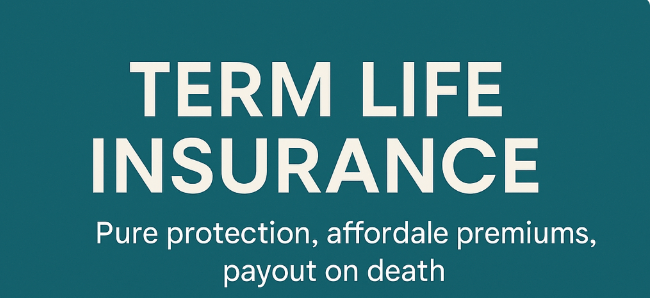Term Life Insurance

Pure Protection, Affordable Premiums, Guaranteed Payout
Introduction: Why Term Life Insurance Matters
Life is unpredictable. While we all hope for long, healthy lives, it’s equally important to plan for uncertainties. That’s where term life insurance steps in — a simple, affordable, and powerful way to secure your loved ones’ financial future. Unlike traditional life insurance that mixes savings and investment, term plans are straightforward: you pay a small premium, and in return, your family receives a large payout if something happens to you during the policy term.
Think of it as a safety net — nothing flashy, just pure protection.
What is Term Life Insurance?
Term life insurance is the simplest form of life insurance. You pay premiums for a fixed period (say 10, 20, or 30 years). If you pass away during this time, your nominee gets a lump sum payout called the death benefit.
If you survive the policy term, there’s no payout — and that’s precisely why premiums are so low compared to other types of life insurance.
In short:
- Pure protection: No savings, no investment, just security.
- Affordable premiums: High coverage at a fraction of the cost.
- Payout on death: Ensures your family is financially supported.
Key Benefits of Term Life Insurance
1. Affordable Premiums for High Coverage
With term insurance, you can get a ₹1 crore cover for as low as the cost of a monthly family dinner. This makes it the most budget-friendly way to ensure financial protection.
2. Financial Security for Your Family
The payout can cover daily expenses, children’s education, home loans, and any outstanding liabilities, ensuring your loved ones never face financial hardship.
3. Flexible Policy Tenure
Choose a term that matches your financial goals — whether until your kids graduate, your home loan is cleared, or your retirement age.
4. Optional Riders for Extra Protection
Enhance your policy with add-ons like:
- Critical illness cover
- Accidental death benefit
- Waiver of premium
5. Tax Benefits
Premiums paid are eligible for tax deductions under Section 80C, and the death benefit is tax-free under Section 10(10D).
Who Should Buy Term Life Insurance?
- Young professionals: To lock in low premiums early.
- Parents: To protect children’s education and future.
- Home loan borrowers: To ensure loans don’t burden your family.
- Primary earners: To replace lost income in case of untimely death.
Term Life Insurance vs Other Life Insurance
Example: Why Term Insurance Works
Imagine you’re 30 years old. You buy a ₹1 crore term policy for 30 years at just ₹800 per month. If something happens to you, your family gets the full ₹1 crore payout.
But if you had gone for an endowment plan, the same coverage would cost you nearly 10x more. Clearly, term plans give maximum cover at minimum cost.
Common Myths About Term Insurance
- Myth: “I get nothing if I survive.”Truth: The purpose is protection, not returns. Think of it like car insurance — you don’t hope to claim it, but it’s essential.
- Myth: “It’s complicated.”Truth: Term plans are the simplest form of life insurance — easy to buy, understand, and manage.
- Myth: “It’s only for older people.”Truth: The younger you are, the cheaper your premium. Buying early saves big money.
How to Choose the Right Term Plan
- Calculate your coverage (ideally 10–15 times your annual income).
- Pick the right term length (cover until retirement or until major financial goals are achieved).
- Compare insurers for claim settlement ratio and reputation.
- Add riders wisely based on your lifestyle and risks.
- Buy early to lock in low premiums.
Conclusion: The Smartest Step for Peace of Mind
Term life insurance isn’t about returns — it’s about responsibility. For just a small monthly cost, you can buy peace of mind, knowing your family’s financial security is guaranteed.
If you haven’t yet, make term insurance your first step toward smart financial planning.
Frequently Asked Questions (FAQs)
Q1: What is the minimum premium for term insurance? Premiums can start as low as a few hundred rupees per month, depending on age, health, and coverage amount.
Q2: Can I increase coverage later? Yes, some policies allow you to increase cover after milestones like marriage or childbirth.
Q3: Is a medical check-up required?Usually, yes. Insurers require a health check to assess your risk and premium.
Q4: What happens if I miss a premium payment?Most insurers provide a grace period (15–30 days). If missed beyond that, the policy may lapse.
Q5: Can NRIs buy term insurance in India?Yes, many insurers allow NRIs to purchase term plans, subject to certain conditions.
